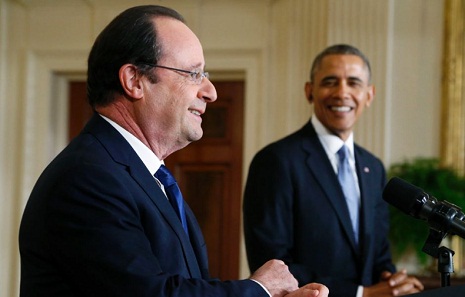WikiLeaks said the documents derived from directly targeted NSA surveillance of the communications of Mr Hollande (2012-present), Mr Sarkozy (2007-2012) and Mr Chirac (1995-2007), as well as French cabinet ministers and the French ambassador to the US.
The White House has denied the allegations.
"We are not targeting and will not target the communications of president Hollande," said National Security Council spokesman Ned Price, calling their partnership "indispensable", while refraining from addressing whether tapping had occurred in the past.
The documents also contained the mobile phone numbers of numerous officials in the Elysee presidential palace, including the number of the president, WikiLeaks said.
They included summaries of conversations between French government officials on the global financial crisis, the Greek debt crisis, and the relationship between the Hollande administration and the German government of Angela Merkel.
The revelations prompted the French president to call an immediate defence council meeting to evaluate the nature of the information published and "to draw useful conclusions", according to one of his aides.
The latest WikiLeaks drop comes just weeks after president Barack Obama signed into law a landmark legislation ending the US government`s bulk telephone data dragnet.
Former NSA employee Edward Snowden created an uproar in Germany after he revealed that Washington had carried out large-scale electronic espionage in Germany and claimed the NSA had bugged Ms Merkel`s phone.
"While the German disclosures focused on the isolated fact that senior officials were targeted by US intelligence, WikiLeaks` publication today provides much greater insight into US spying on its allies," WikiLeaks said.
This includes "the actual content of intelligence products deriving from the intercepts, showing how the US spies on the phone calls of French leaders and ministers for political, economic and diplomatic intelligence".
WikiLeaks founder Julian Assange said French citizens had a right to know their government was "subject to hostile surveillance from a supposed ally", and promised more "timely and important" revelations soon.
`Unacceptable methods` used, Sarkozy aide says
The most recent document was dated May 22, 2012, just days before Mr Hollande took office, and revealed the French leader "approved holding secret meetings in Paris to discuss the eurozone crisis, particularly the consequences of a Greek exit from the eurozone".
Another document dated 2008 was titled "Sarkozy sees himself as only one who can resolve world financial crisis", and, according to Wikileaks, "blamed many of the current economic problems on mistakes made by the US government, but believes that Washington is now heeding some of his advice".
Chirac`s choice for appointments at the United Nations was the subject of a file dated 2006.
In that same document, then foreign minister Philippe Douste-Blazy was described as someone who has the "propensity ... for making ill-timed or inaccurate remarks".
The French ambassador to the US Gerard Araud appeared to downplay the revelations, stating on Twitter: "Every diplomat lives with the certainty that their communications are listened to, and not by just one country. Real world."
But an aide of Sarkozy blasted the alleged spying as "unacceptable methods as a general rule and more particularly between allies".
WikiLeaks said French readers could "expect more timely and important revelations in the near future".
Last week, WikiLeaks published more than 60,000 diplomatic cables from Saudi Arabia and said on its website it would release half a million more in the coming weeks.
More about:
















































